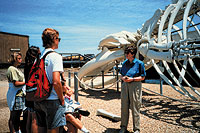![[Currents header graphic]](/homeart/currents_header.gif)
![[Currents header graphic]](/homeart/currents_header.gif)
January 11, 1999
By Tim Stephens
Do crabs bleed when they lose an arm? Can an octopus live out of water? Do sea stars have a brain? These and other challenging questions are regularly fielded by the interpretive guides at Long Marine Laboratory. With training from UCSC scientists and staff, the volunteer guides introduce visitors to the many wonders of marine life in the Monterey Bay and elsewhere. They give tours of the lab's marine research facilities, interpret exhibits, and, of course, answer questions.

|
|
Docents like Lisa Borok, right, answer all kinds of ocean-related questions at Long Marine Lab. Photo: Gary McDonald |
Long Marine Lab is now recruiting additional volunteers to serve as interpretive guides at the lab's Marine Discovery Center, scheduled to open this fall. Information sessions for people interested in volunteer opportunities will be held at Long Marine Lab on Saturday, January 23, from 11 a.m. to noon, and on Thursday, January 28, from 4 to 5 p.m. The sessions will include a slide show, a tour of the lab, and information and applications for volunteering.
Long Marine Lab's education programs for schoolchildren and the general public currently draw more than 30,000 visitors every year. The Marine Discovery Center will enable the lab to greatly expand its public education programs.
"With the opening of the new Marine Discovery Center, we hope to be able to triple the number of visitors and schoolchildren served, and that means tripling the number of volunteers," said volunteer coordinator Sally Real.
The 17,000-square-foot Marine Discovery Center will house two teaching classrooms, an ocean-view auditorium, aquaria teeming with marine life, a new touch pool, and interpretive space that profiles research projects conducted by scientists in UCSC's Institute of Marine Sciences.
Volunteers are at the heart of the success of Long Marine Lab's public education programs. In addition to serving as interpretive guides, volunteers help with special events, feed the animals in the aquaria, and work in the book and gift shop.
"Our volunteers are a dedicated group of people from a variety of backgrounds, who have in common a love of the ocean, a curiosity about marine science, and a desire to share knowledge," Real said.
Interpretive guides receive extensive training from UCSC scientists and staff. Real is now accepting applications for the next training class for interpretive guides, scheduled to begin February 23. Space in the 12-week course is limited, so early registration is encouraged. The class will prepare volunteers to interpret exhibits at the new center, engage visitors in interactive activities, and lead tours of the lab and marine mammal research area.
"No prior knowledge is required, just a commitment of time, a willingness to volunteer for one year, and a desire to get your hands wet at the touch pool," Real said.
For more information about volunteer opportunities at Long Marine Lab, contact Sally Real at (831) 459-3854 or sjreal@cats.ucsc.edu.